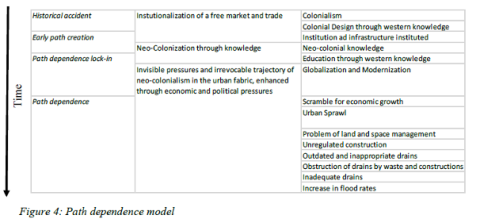Key findings
The role of neo-colonization reflects the indirect pressures of developed countries on developing countries when it comes to economic, intellectual, political and cultural influences. It is perpetuated through western knowledge in the urban field of study and subsequently determines the trajectory of urbanization in a city.
This thesis elaborates on how neo-colonial knowledge influences planning with Port-Louis, Mauritius (Buttes a Tonnier, Le Pouce and Ruisseau Creole) in question. The design inadequacies of the drains in Port-Louis lie in their original design which was based on colonial knowledge and measurements from the French period dating as far as the 1800s. Ever since, the planning department was sticking to neo-colonial ways of working for quite a long time. However, planning is also influenced by poor methods and poor planning capacities. Hence, research indicates that the intensification of flood events in Port-Louis is impacted by colonial design in that the latter has led to the spread of unsustainable construction practices and did not make room for adequate urban development. The pressure to engage in lucrative urban projects has resulted in urban sprawl, subsequently increasing the percentage of impermeable surfaces in the city and creating unfavorable hydrological conditions.
Within neo-colonization, knowledge of green infrastructure plays an important role. The application of knowledge becomes more resilient with a good mix of local and international knowledge. Knowledge gained internationally nevertheless brings a constructive perspective and broadens one’s applications of certain solutions in one’s field.
Barriers and boosts of knowledge exchange
What boosts knowledge exchange includes the international exchange of ideas, research, and observations beyond the local environment. Today, urban actors feel pressurized to exchange knowledge and to have different actors to exchange knowledge with to diffuse and continuously stimulate knowledge.
Barriers to knowledge exchange include international and global pressures, relying on old practices, economic and political pressure, and neo-colonization itself.
What urban professionals can pick up from this thesis
This thesis welcomes urban professionals to rethink the important role played by knowledge sharing, and its source and influences in the composition of cities. Applying path dependency theory to this study provides future studies with the opportunity to uncover history, particularly in terms of how it shaped the cities of today. While present day cities may be assumed to follow a ‘logical’ and imminent path, it is important to consider the invisible hands at play in their trajectory. This process helps to identify complex issues that may have previously been overlooked.

